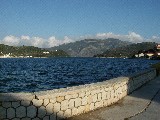
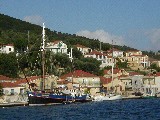
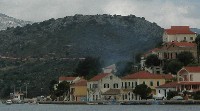 But as it was for Odysseus, it was in the morning when, already landed, we could at last see Mount Neritum, and the sailing vessels in the harbor, and the smoke rising up from this beautiful island.
But as it was for Odysseus, it was in the morning when, already landed, we could at last see Mount Neritum, and the sailing vessels in the harbor, and the smoke rising up from this beautiful island.


 But as it was for Odysseus, it was in the morning when, already landed, we could at last see Mount Neritum, and the sailing vessels in the harbor, and the smoke rising up from this beautiful island.
But as it was for Odysseus, it was in the morning when, already landed, we could at last see Mount Neritum, and the sailing vessels in the harbor, and the smoke rising up from this beautiful island.
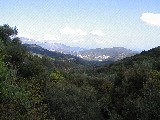
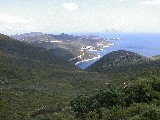
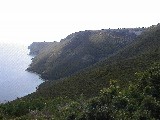 The goddess Athena counsels the new-landed Odysseus: "Then go at once to the swineherd who is in charge of your pigs; he has been always well affected towards you, and is devoted to Penelope and your son; you will find him feeding his pigs near the rock that is called Raven by the fountain Arethusa, where they are fattening on beechmast and spring water after their manner." (Homer Odyssey [trans. Samuel Butler] 13.404-410. Afterwards Odysseus goes to the place specified and finds Eumaeus has a hut there, where many scenes are set in the poem's second half, including the recognition scene with Telemachus.) After breakfast we went for a walk to this place. People got rather hot and it was too prickery for those who wore skirts, but there were splendid prospects of the island. The whole lushly vegetated hillside seemed absolutely untouched except for the most basic and primitive of footpaths, and so it seemed very likely that the place was wholly unchanged since the bronze age--unless of course the poem is implying that there were beech trees here then.
The goddess Athena counsels the new-landed Odysseus: "Then go at once to the swineherd who is in charge of your pigs; he has been always well affected towards you, and is devoted to Penelope and your son; you will find him feeding his pigs near the rock that is called Raven by the fountain Arethusa, where they are fattening on beechmast and spring water after their manner." (Homer Odyssey [trans. Samuel Butler] 13.404-410. Afterwards Odysseus goes to the place specified and finds Eumaeus has a hut there, where many scenes are set in the poem's second half, including the recognition scene with Telemachus.) After breakfast we went for a walk to this place. People got rather hot and it was too prickery for those who wore skirts, but there were splendid prospects of the island. The whole lushly vegetated hillside seemed absolutely untouched except for the most basic and primitive of footpaths, and so it seemed very likely that the place was wholly unchanged since the bronze age--unless of course the poem is implying that there were beech trees here then.
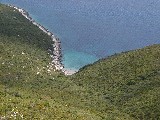
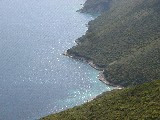 Looking down we could see the blue Ionian sparkling in the sun and clearly discern the contrast between the seaweed and sand underneath.
Looking down we could see the blue Ionian sparkling in the sun and clearly discern the contrast between the seaweed and sand underneath.
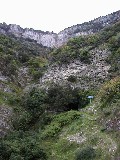
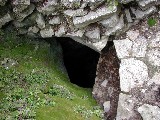
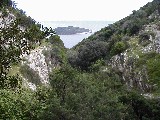 Here are the spring itself (with the "Raven" crag above) and the view down the ravine from the fountain to the sea.
Here are the spring itself (with the "Raven" crag above) and the view down the ravine from the fountain to the sea.
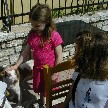 At lunch the children made another friend. Ithaca hounds, from Odysseus' own "Argus" on down, have a special place in the heart. (Some of my readers will well remember a certain "Ithaca frog-hound" named Daisy, who joined the family a few years after my own birth in Ithaca, New York.)
At lunch the children made another friend. Ithaca hounds, from Odysseus' own "Argus" on down, have a special place in the heart. (Some of my readers will well remember a certain "Ithaca frog-hound" named Daisy, who joined the family a few years after my own birth in Ithaca, New York.)
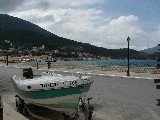 Naturally the islanders cherish the Odyssey connection; this little runabout is named for Odysseus' son.
Naturally the islanders cherish the Odyssey connection; this little runabout is named for Odysseus' son.